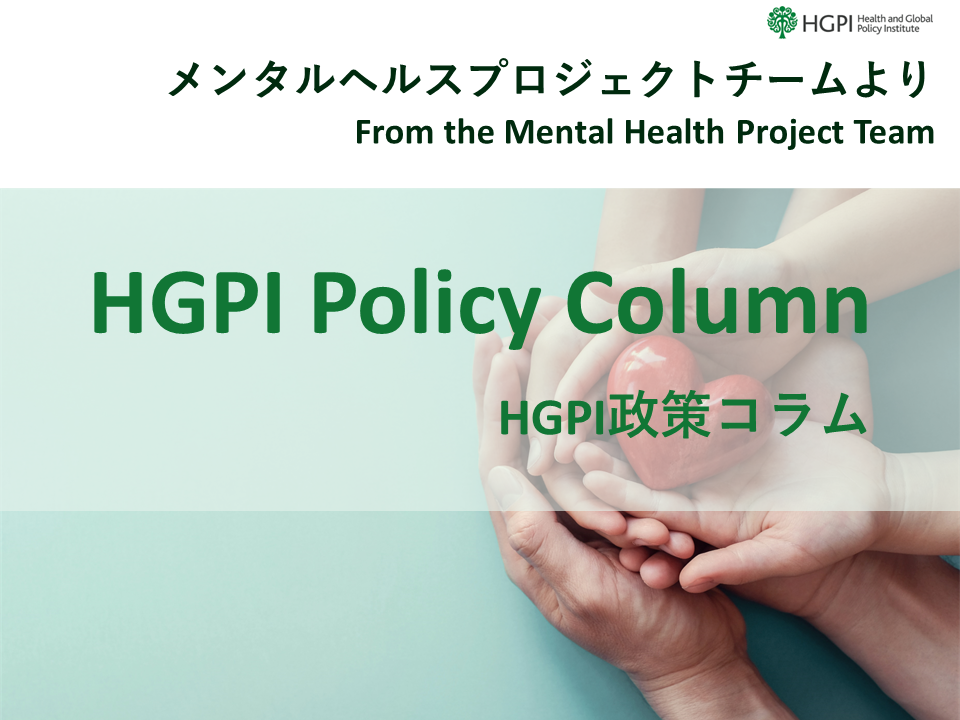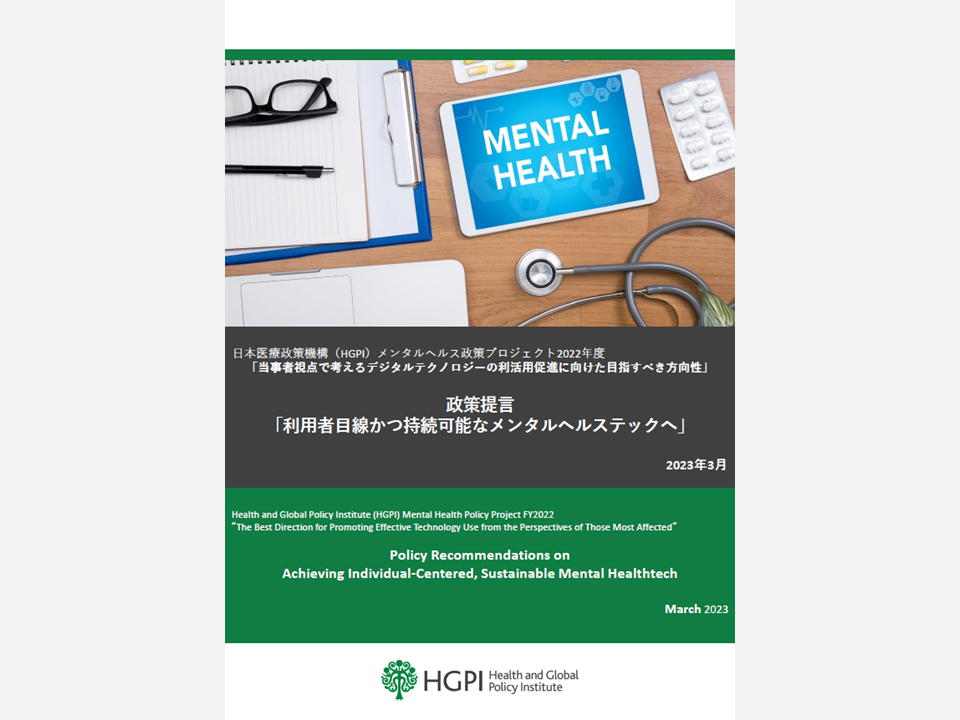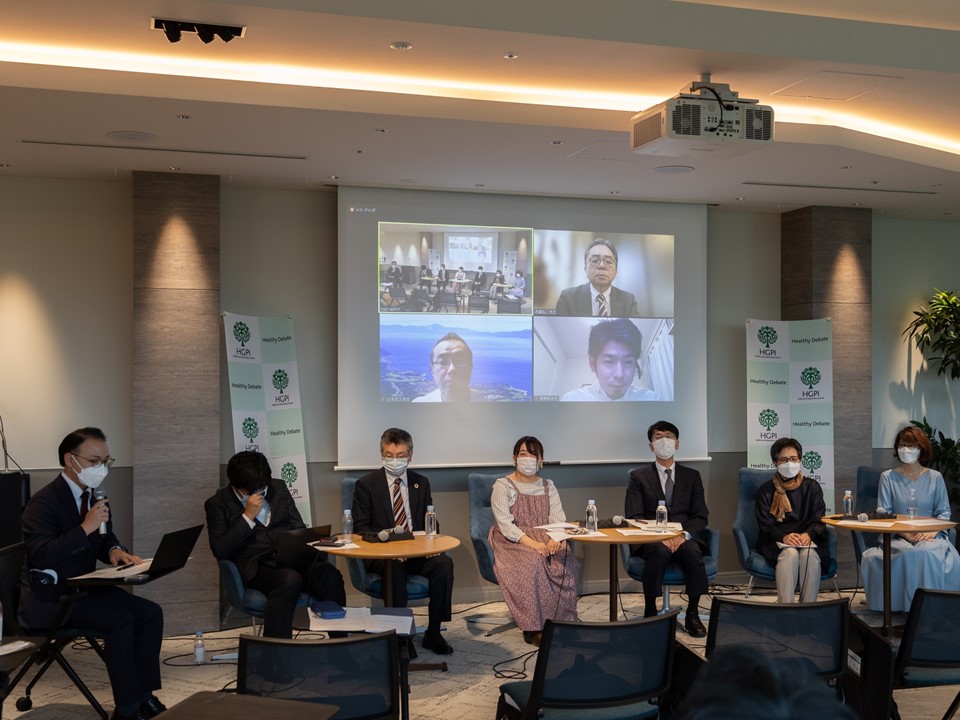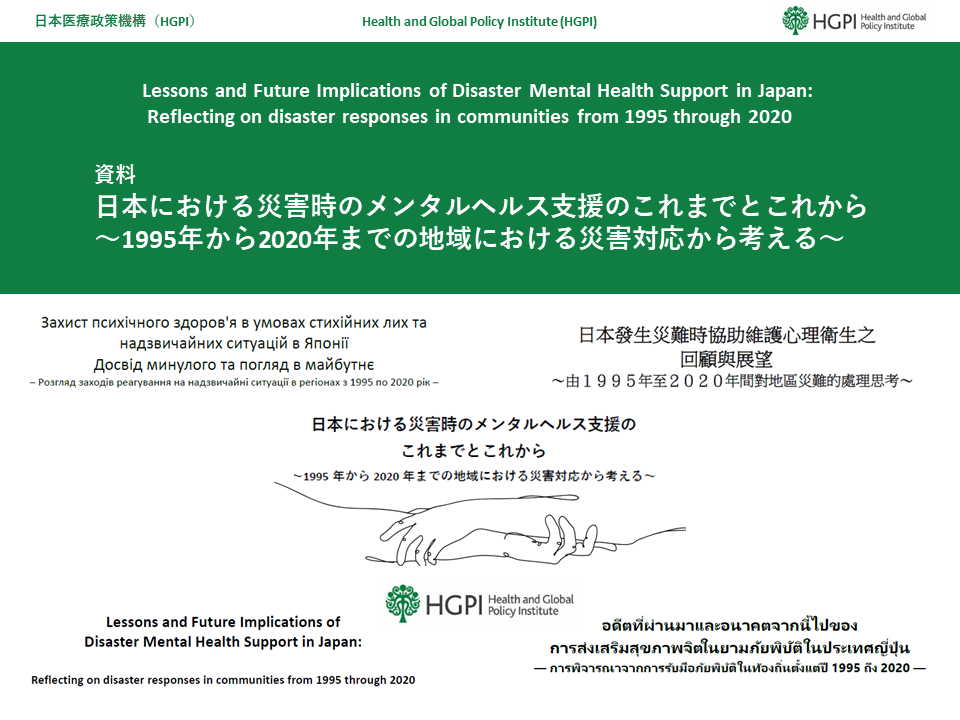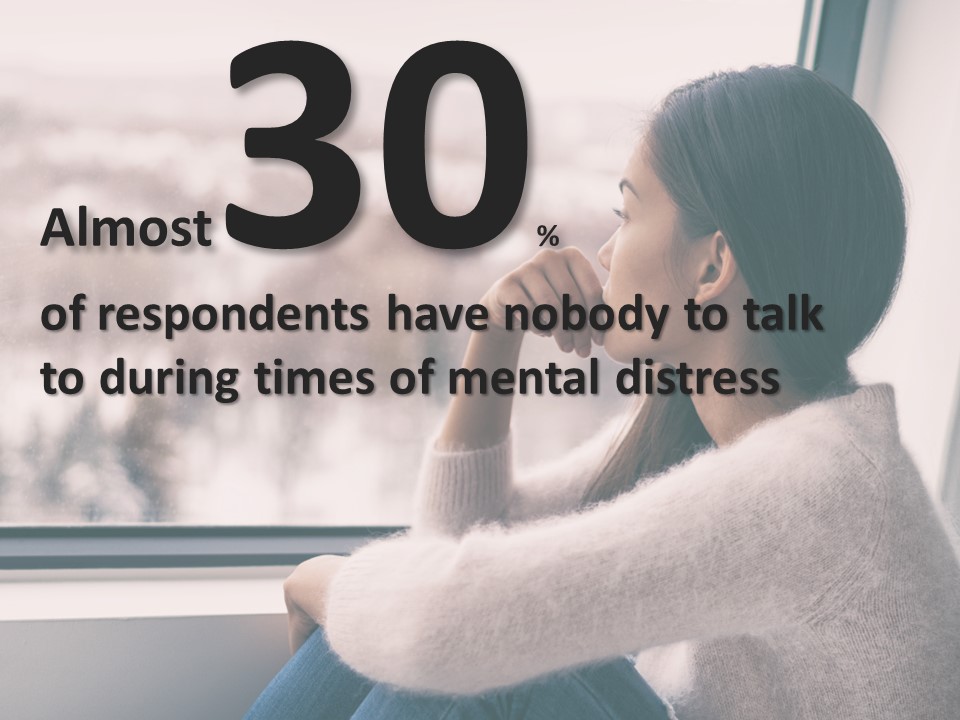[HGPI Policy Column] (No.49) From the Mental Health Project ”Changes in the Japanese Mental Health Policy and Future Policy Topics” (The 2nd part ”Issues surrounding long-term hospitalization and future policy topics”)
date : 10/31/2024
Tags: HGPI Policy Column, Mental Health
![[HGPI Policy Column] (No.49) From the Mental Health Project ”Changes in the Japanese Mental Health Policy and Future Policy Topics” (The 2nd part ”Issues surrounding long-term hospitalization and future policy topics”)](https://hgpi.org/en/wp-content/uploads/sites/2/column-49-top.png)
<POINTS>
- There is a growing demand for community consultation and outpatient mental health care. Moreover, although the number of inpatients is declining, the inpatient care delivery system is far from adequate in terms of staffing and human rights.
- With the enactment of the Act on Mental Health and Welfare for Persons with Mental Disorders or Disabilities in 2024, local governments are anticipated to enhance their consultation and support systems. Additionally, seamless medical coordination from inpatient care to community living, including the “Community-based Integrated Care System for Mental Disorders (Nimo-Houkatsu)”, which is aimed at facilitating hospital discharge, is expected to be refined.
- Examples of expected future innovations in the field of mental health include the promotion of medical DX (digital transformation) and personalized psychiatry (precision medicine).
Introduction
In the second part of this three-part series on mental health policy column, we focus on “Issues Surrounding Long-Term Hospitalization and Future Policy Topics”, exploring the latest policy developments and analyzing current issues from multiple perspectives. HGPI has been dedicated to policy advocacy aimed at enhancing the Quality of Life (QOL) for healthcare beneficiaries. This is achieved through collaboration with various stakeholders, ensuring that the perspectives and voices of healthcare beneficiaries are appropriately heard and addressed. However, in the field of mental health, significant improvements have yet to be achieved due to the strong stigma that remains in society, stemming from the nature of these disorders. It is essential to first develop and foster public understanding of mental illnesses to promote innovation in mental health policy. This article aims to outline the current situation of medical and welfare services related to mental health in Japan, and to discuss future trends, taking into account the implementation of the Act on Mental Health and Welfare for Persons with Mental Disorders or Disabilities in 2024.
Trends in the number of outpatient consultations
As of 2020, the total number of patients with mental disorders in Japan was 6.148 million, with 5.861 million being outpatients (according to the 2023 Edition Annual Health, Labour and Welfare Report). Outpatients accounted for 95.3% of the total number of patients, and this number has been increasing annually. It is anticipated that the demand for mental health care will continue to rise in the future.
Trends in the number of voluntary hospitalizations, involuntary hospitalizations for medical care and protection, and involuntary hospitalizations for persons with threat of bodily harm to themselves or others
As of October 1, 2021, the number of inpatients in psychiatric beds is approximately 260,000, of which 130,000 are voluntary hospitalizations, approximately 130,000 are involuntary hospitalizations for medical care and protection, and about 1,500 are involuntary hospitalizations for persons with threat of bodily harm to themselves or others. The number of “notifications of involuntary hospitalizations for medical care and protection” is 181,787, a decrease of 3,358 (1.8%) compared to the previous year, but the number remains high. A characteristic feature of the Japanese healthcare system is that the number of involuntary hospitalizations is almost the same as the number of voluntary hospitalizations.
Approximately 160,000 patients have been hospitalized for over a year (about two-thirds of which are inpatients) according to the 2023 Mental Health and Welfare Data. Although around 50,000 of these patients are discharged each year, approximately 35,000 new patients transition to long-term hospitalization of over a year annually. While about 90% of new admissions are discharged within a year, the discharge rate drops significantly to about 25% for those hospitalized for over a year. Therefore, support for promoting early discharge is essential.
Three types of psychiatric hospitalization by Motoyuki Goto
As part of research on psychiatric medical care, Motoyuki Goto’s classification of psychiatric hospital admission systems is noteworthy. He categorizes psychiatric hospitalization into three types; the “social defense type”, which includes public expense admissions such as involuntary hospitalization, the “treatment type”, which involves admissions paid for by private expense or social insurance, and the “social welfare type”, which includes public expense admissions for life support. He examined the financial expenditures and public spending from each pathway annually and concluded that various reforms in each type’s system have influenced the increase in psychiatric hospital beds. Additionally, it is suggested that there are differences in the social attributes, duration of hospitalization, and actual conditions of hospitalization among these three types. The historical changes in the hospitalization system for psychiatric patients after World War II that were introduced in the previous column, have had a significant impact. However, considering the concluding observations (recommendations) of the United Nations based on the Convention on the Rights of Persons with Disabilities, it is regarded as imperative to reconsider the form of support for the individuals involved. The 2022 legal amendment (to be enforced in 2024) was also made based on these recommendations, but continuous discussion will be necessary.
The 2022 Act Partially Amending the Act on Providing Comprehensive Support for the Daily Life and Life in Society of Persons with Disabilities and Other Acts (Especially the implementation status and issues of the review committee concerning involuntary hospitalization for medical care and protection)
In recent times, with media coverage of abuse in psychiatric wards and growing social concern, the 2024 enactment of the “Act Partially Amending the Act on Providing Comprehensive Support for the Daily Life and Life in Society of Persons with Disabilities and Other Acts” has been implemented, considering the review of involuntary hospitalization, improvement of treatment for hospitalized patients, and information disclosure of psychiatric hospitals. At the same time, the “Act on Mental Health and Welfare for Persons with Mental Disorders or Disabilities” was also amended as a consolidated bill. Key amendments include the establishment of a maximum hospitalization period of six months for involuntary hospitalization for medical care and protection and the introduction of mandatory reporting of abuse, aiming to enhance the protection of patients’ rights and strengthen cooperation. Regarding the protection of rights, the “Mental Health Review Board” has been expected to play the role. However, it has been pointed out that there are disparities in the content of operations, methods of management, composition of deliberative bodies, and the number of committee members among the review boards operated by each prefecture and designated city. The Japan Association of Psychiatric Social Workers has been working on clarifying and strengthening the roles of welfare committee members, including conducting group interview surveys with psychiatric social workers involved in the Mental Health Review Board. However, there are many issues left to address.
Challenges Related to Promoting Discharge
We have previously discussed the length of hospital stays and involuntary hospitalization. We would now like to organize the current situation from the perspective of promoting discharge. Firstly, as a premise, the staffing standards for psychiatric beds are set lower than those for general beds The staffing standards for psychiatric emergency and acute wards are significantly lower than those for general wards. In the recovery wards, the revision of medical fees in 2024 changed the additional fees related to the inpatient fees for wards with enhanced community transition functions. In addition to nursing staff, occupational therapists or psychiatric social workers are required to be involved in discharge support, and are expected to strengthen human resource structure. However, since the calculation criteria are strictly set, further discussions are needed to know how best to use this system to reinforce the staffing structure.
Generally, while the number of long-term inpatients is decreasing, the number of long-term inpatients aged 65 and over is on the rise. The government anticipates a decrease in the future number of inpatients, but this is largely due to the fact that over 10,000 long-term inpatients die and are discharged each year, against the backdrop of an aging population and population decline. The reasons for long-term hospitalization not only include the time required for treatment but also issues such as difficulties in arranging a place to return to, including securing housing or facilities. It is crucial to support patients that have been discharged from the perspective of the social security systems and housing. Achieving the generally envisioned scenario of “discharge upon remission” will take many years to be widely realized.
In the 2024 revision of reimbursement, the direction is towards enhanced support for early discharge from hospital, with the establishment of a new inpatient fee for psychiatric community care wards and an additional fee for initial transition to home and other places.
Implementation Status and Challenges of Community Transition and Community Settlement Support
(Overview and Implementation Status of Newly Added Inpatient Visit Support Projects)
Even after discharge, challenges remain in transitioning service provision from hospitals to the community. Currently, the number of facilities for community life support is increasing, and when looking at the entities establishing these facilities, there is a notable increase in those set up by for-profit corporations. However, there are many new entrants in the disability welfare services sector with little experience or track record, raising concerns about the quality of support, considering the characteristics and severity of disabilities. This highlights the challenges of transition support for community life and support for continuing community life. Additionally, with the amendment of the Act on Mental Health and Welfare for Persons with Mental Disorders or Disabilities, the inpatient visit support project, which was implemented from April 2024, allows visiting support staff to be dispatched to patients of involuntary hospitalization for medical care and protection based on their wishes. While the need to strengthen the cooperation system between the community and medical institutions is increasingly emphasized, it is also necessary to verify its practicality and how it will be operated in the future.
“Community-based Integrated Care System for Mental Disorders (Nimo-Houkatsu)”
The “Community-based Integrated Care System for Mental Disorders (Nimo-Hokatsu)” is a system that ensures comprehensive support in areas such as medical care, disability welfare and nursing care, housing, social participation (including employment), community mutual aid, and public awareness (including education), so that everyone can live comfortably and authentically, regardless of the presence or degree of mental illness. It is essential for realizing a community-based inclusive society. It is necessary to build a support system through multi-stakeholder collaboration, facilitated by discussions at the municipal level. Eliminating discrimination and prejudice against people with mental illnesses is also crucial in establishing Nimo-Hokatsu.
The national and local governments are promoting the participation of peer supporters, such as patients and family members, in discussion forums. Patient and public participation at the municipal level can be seen as the first step towards patient-and-public -centered policy-making. However, there are significant challenges in developing and securing people who can participate, and it is necessary to consider how to provide support for this initiative.
Key points to watch regarding legislative amendments; The roles of municipalities, consultation support systems, and discharge promotion.
Due to legislative amendments, the role expected of municipalities in the field of mental health has become significant. In building a consultation support system, it is necessary to discuss the utilization of peer supporters in the future. Additionally, as the collaboration system between municipalities and medical institutions becomes more important, making an effort to secure and improve the quality of counselors and supporting staff should also be highlighted. Furthermore, it is necessary to create a social infrastructure for community living that can accommodate the discharge of individuals from hospitals. It is hoped that an environment where individuals can live comfortably will be established without regional disparities by referencing the advanced initiatives of municipalities that are engaging in medical-welfare collaboration, cooperation with real estate associations, and the use of peer supporters.
Future Topics ~Innovations in the Field of Mental Health~
In the field of mental health, there is growing expectation for medical digital transformation (DX) and precision psychiatry. Regarding medical DX, the advantage lies in the fact that it is effective in providing support through internet environments, especially in the mental health field where it is difficult to connect with medical services. Additionally, digitalization should be employed as one of the innovations to create an environment where patients and doctors, especially patients can actively communicate, thereby achieving more appropriate treatments. Furthermore, there will be more opportunities to use this technology in the future as tools to alleviate the mental burden of long-term hospitalized patients, their families, and related parties.
Moreover,research is being conducted both domestically and internationally to achieve progress in precision psychiatry, which involves providing treatment and support tailored to each individual’s genes, medical conditions, and background. It will be necessary to discuss on how to conduct research and establish systems to make precision psychiatry a reality in Japan. It is expected that these discussions will advance under the collaboration with stakeholders, including patients and their families, known as Patient and Public Involvement (PPI). In the next column, we would like to introduce the current state of global research and initiatives related to the promotion of precision psychiatry and stakeholder involvement.
Works referenced
1. Goto Motoyuki. (2019). Historical Structure of Psychiatric Hospitalization in Japan: Social Defense, Treatment, and Social Welfare. The University of Tokyo Press.
2. The Ministry of Health, Labour and Welfare: Future Directions for Specific Measures to Transition Long-Term Hospitalized Patients with Mental Disorders to Community Living. https://www.mhlw.go.jp/file/05-Shingikai-12201000-Shakaiengokyokushougaihokenfukushibu-Kikakuka/0000051138.pdf. Accessed October 10, 2024.
3. The Ministry of Health, Labour and Welfare. Annual Health, Labour and Welfare Report 2023. https://www.mhlw.go.jp/wp/hakusyo/kousei/22/dl/zentai.pdf . Accessed October 10, 2024.
4. The Japanese Association of Mental Health Social Workers: Survey Report on the Questionnaire Survey Regarding Psychiatric Review Boards. https://www.mhlw.go.jp/content/12200000/000906067.pdf. Accessed October 10, 2024
5. The Ministry of Health, Labour and Welfare: Standards and Fees Related to Support for Independent Living, Community Transition Support, Community Stability Support, Community Living Support Bases. https://www.mhlw.go.jp/content/12401000/001159438.pdf. Accessed October 10, 2024.
6. Health and Global Policy Institute (2024). Research report of interviews ”Expectations for the Coming Era of Healthcare DX from People Living with Health Concerns”. https://hgpi.org/en/research/dx-20240610.html. Accessed October 10, 2024
7. The Ministry of Health, Labour and Welfare: The Current State of Mental Health, Medical, and Welfare Services. https://www.mhlw.go.jp/content/12200000/001226180.pdf. Accessed October 10, 2024
8. Toyoaki Hirata. Current Status and Challenges of the Psychiatric Review Board System. https://www.mhlw.go.jp/file/05-Shingikai-12201000-Shakaiengokyokushougaihokenfukushibu-Kikakuka/0000123315.pdf. Accessed October 10, 2024
9. National Center of Neurology and Psychiatry. Overview of the June 30, FY2023 Survey. https://www.ncnp.go.jp/nimh/seisaku/data/assets/excel/r5/r5_other_totalization_630.zip?v=2024032601. Accessed October 10, 2024.
Authors
Akari Hase (Program Specialist, Health and Global Policy Institute)
Favour Omileke (Program Specialist, Health and Global Policy Institute)
Chise Nishiyama (Intern, Health and Global Policy Institute)
Shu Suzuki (Senior Associate, Health and Global Policy Institute)
Top Research & Recommendations Posts
- [Policy Recommendations] The Path to a Sustainable Healthcare System: Three Key Objectives for Public Deliberation (January 22, 2026)
- [Research Report] Perceptions, Knowledge, Actions and Perspectives of Healthcare Organizations in Japan in Relation to Climate Change and Health: A Cross-Sectional Study (November 13, 2025)
- [Research Report] The 2025 Public Opinion Survey on Healthcare in Japan (March 17, 2025)
- [Policy Recommendations] Reshaping Japan’s Immunization Policy for Life Course Coverage and Vaccine Equity: Challenges and Prospects for an Era of Prevention and Health Promotion (April 25, 2025)
- [Research Report] The 2023 Public Opinion Survey on Satisfaction in Healthcare in Japan and Healthcare Applications of Generative AI (January 11, 2024)
- [Research Report] AMR Policy Update #4: Cancer Care and AMR (Part 1)
- [Public Comment Submission] “Assessment Report on Climate Change Impacts in Japan (Draft Overview)” (December 24, 2025)
- [Policy Recommendations] Developing a National Health and Climate Strategy for Japan (June 26, 2024)
- [Research Report] The Public Opinion Survey on Child-Rearing in Modern Japan (Final Report) (March 4, 2022)
- [Research Report] The 2026 Public Opinion Survey on Healthcare in Japan (February 13, 2026)
Featured Posts
-
2026-01-09
[Registration Open] (Hybrid Format) Dementia Project FY2025 Initiative Concluding Symposium “The Future of Dementia Policy Surrounding Families and Others Who Care for People with Dementia” (March 9, 2026)
![[Registration Open] (Hybrid Format) Dementia Project FY2025 Initiative Concluding Symposium “The Future of Dementia Policy Surrounding Families and Others Who Care for People with Dementia” (March 9, 2026)](https://hgpi.org/en/wp-content/uploads/sites/2/dementia-20260309-top.png)
-
2026-02-05
[Registration Open] (Webinar) The 141st HGPI Seminar “Current Status and Future Prospects of Korea’s Obesity Policy: Voices of People with Lived Experience in Policy Promotion” (March 3, 2026)
![[Registration Open] (Webinar) The 141st HGPI Seminar “Current Status and Future Prospects of Korea’s Obesity Policy: Voices of People with Lived Experience in Policy Promotion” (March 3, 2026)](https://hgpi.org/en/wp-content/uploads/sites/2/hs141-top-1.png)




